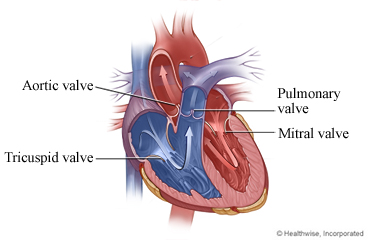
Overview
Your heart is a muscular pump that has four chambers and four valves. The four valves are the mitral, aortic, tricuspid, and pulmonary valves. The valves open and close to keep blood flowing in the proper direction through your heart. When something is wrong with one of the valves, the blood cannot flow in and out of the heart properly. Problems with the heart valves can cause leaks (valve regurgitation) and blockages (valve stenosis). You can be born with heart valve disease, or it can develop over a number of years.
Mild cases of heart valve disease may not cause problems, but more serious cases will weaken the heart and can lead to heart failure. Treatment with medicine can help relieve symptoms, but it will not fix the valve. You may choose to have the valve replaced or repaired.
Follow-up care is a key part of your treatment and safety. Be sure to make and go to all appointments, and call your doctor if you are having problems. It's also a good idea to know your test results and keep a list of the medicines you take.
How can you care for yourself at home?
- Take your medicines exactly as prescribed. Call your doctor if you think you are having a problem with your medicine. You will get more details on the specific medicines your doctor prescribes.
- Eat a heart-healthy diet. For example, eat more fruits, vegetables, fish, lean meats, whole grains, and other high-fiber foods. Limit sodium, sugar, and alcohol.
- Be active. Ask your doctor what type and level of exercise is safe for you. Walking is a good choice. You also may want to swim, bike, or do other activities.
- Stay at a healthy weight. Lose weight if you need to.
- Do not smoke. Smoking can cause more heart problems. If you need help quitting, talk to your doctor about stop-smoking programs and medicines. These can increase your chances of quitting for good.
- Manage other health problems. These include diabetes, high blood pressure, and high cholesterol. If you think you may have a problem with alcohol or drug use, talk to your doctor.
- Avoid infections such as COVID-19, colds, and the flu. Get a pneumococcal vaccine. If you have had one before, ask your doctor if you need another dose. Get a flu vaccine every year. Stay up to date on your COVID-19 vaccines.
- Take care of your teeth and gums. Get regular dental checkups. Good dental health is important because bacteria can spread from infected teeth and gums to the heart valves.
- If you have had a valve repaired or replaced, you may need to take antibiotics before you have certain dental or surgical procedures.
When should you call for help?
Call 911 anytime you think you may need emergency care. For example, call if:
- You have severe trouble breathing.
- You cough up pink, foamy mucus and you have trouble breathing.
- You have symptoms of a heart attack. These may include:
- Chest pain or pressure, or a strange feeling in the chest.
- Sweating.
- Shortness of breath.
- Nausea or vomiting.
- Pain, pressure, or a strange feeling in the back, neck, jaw, or upper belly or in one or both shoulders or arms.
- Lightheadedness or sudden weakness.
- A fast or irregular heartbeat.
- You have symptoms of a stroke. These may include:
- Sudden numbness, tingling, weakness, or loss of movement in your face, arm, or leg, especially on only one side of your body.
- Sudden vision changes.
- Sudden trouble speaking.
- Sudden confusion or trouble understanding simple statements.
- Sudden problems with walking or balance.
- A sudden, severe headache that is different from past headaches.
- You passed out (lost consciousness).
Call your doctor now or seek immediate medical care if:
- You have new or increased shortness of breath.
- You are dizzy or lightheaded, or you feel like you may faint.
- You have sudden weight gain, such as more than 2 to 3 pounds in a day or 5 pounds in a week. (Your doctor may suggest a different range of weight gain.)
- You have increased swelling in your legs, ankles, or feet.
Watch closely for changes in your health, and be sure to contact your doctor if you have any problems.
Where can you learn more?
Go to http://www.healthwise.net/patientEd
Enter L495 in the search box to learn more about "Heart Valve Disease: Care Instructions".
Current as of: July 31, 2024
Author: Ignite Healthwise, LLC Staff
Clinical Review Board
All Healthwise education is reviewed by a team that includes physicians, nurses, advanced practitioners, registered dieticians, and other healthcare professionals.

